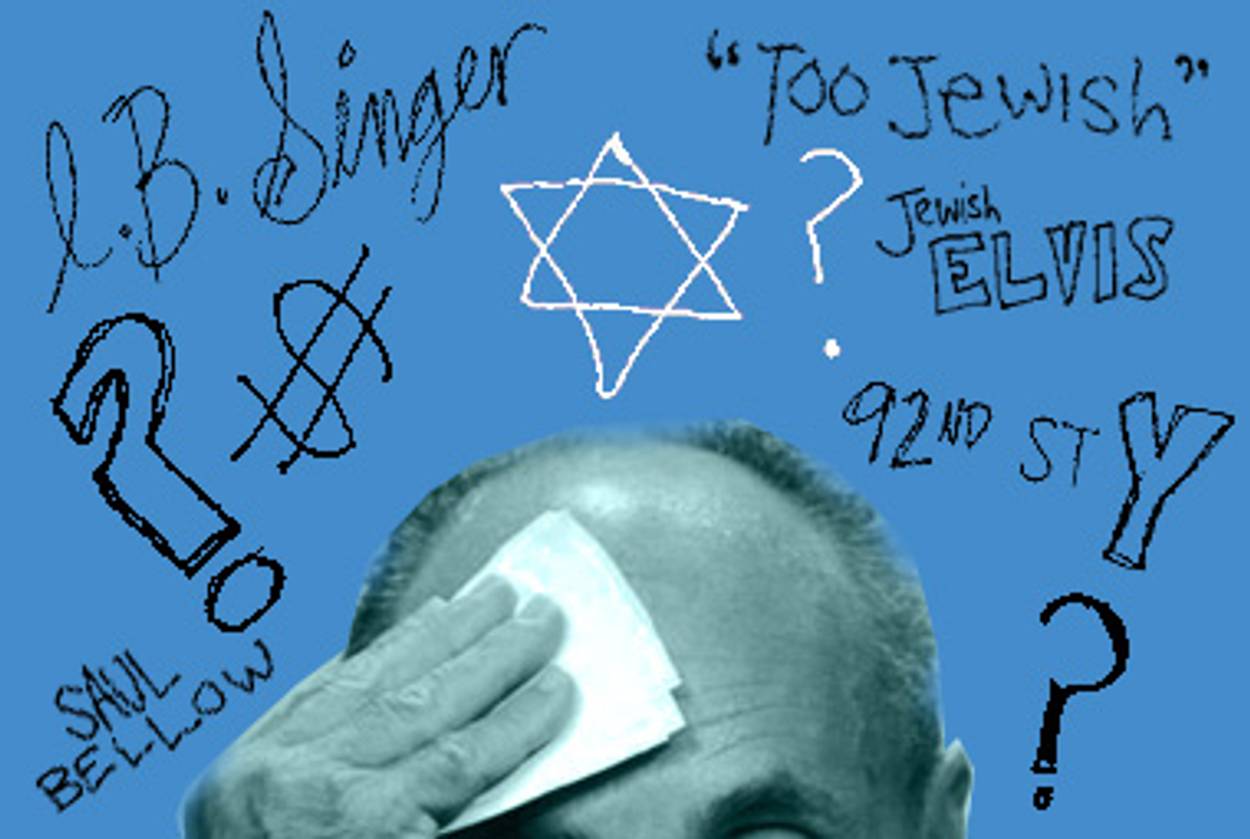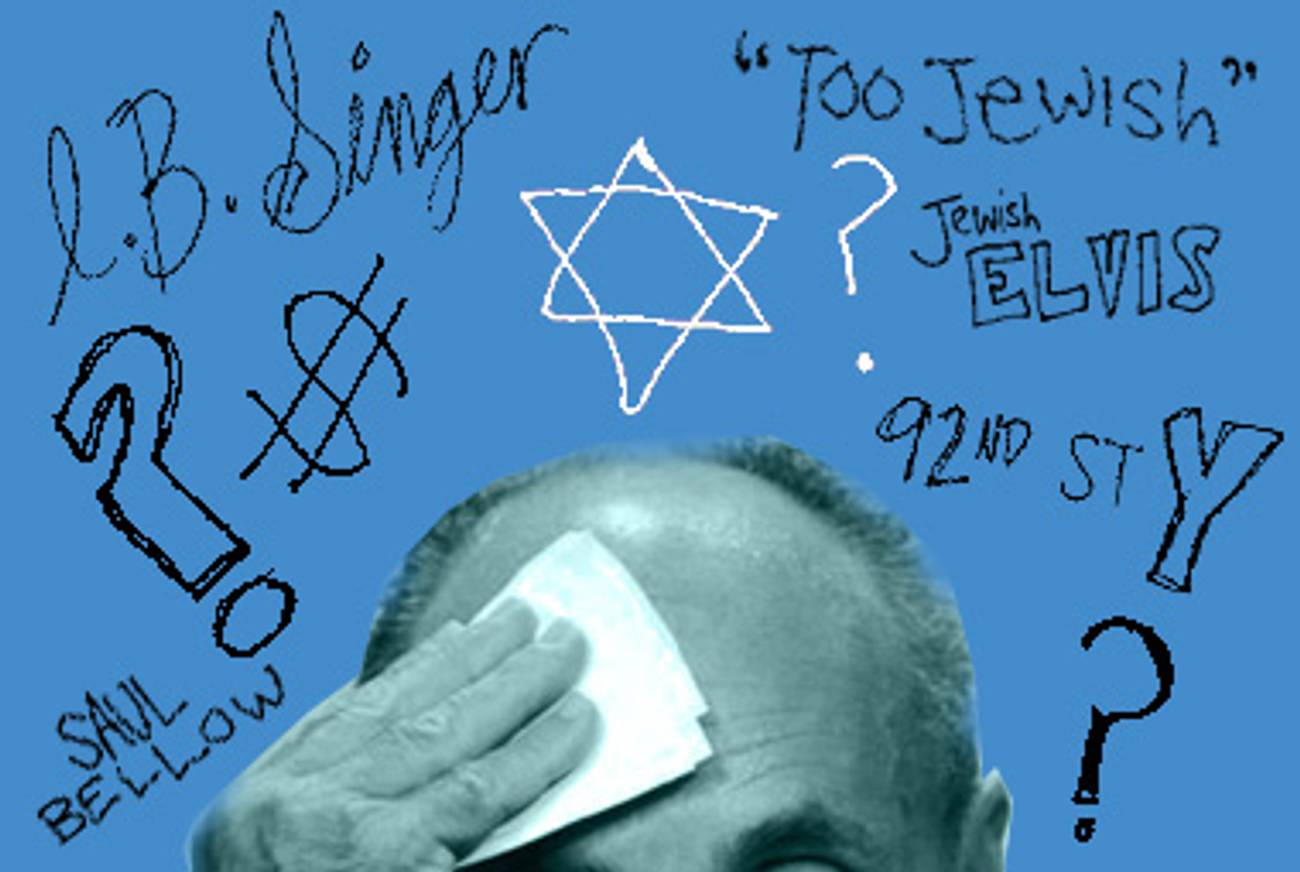Guilt By Association
A novelist reflects on what it means to be a Jewish writer




It may well happen like this:
You’ll be sitting in the Pain Quotidien café enjoying a cup of hot apple cider. A reporter seated across from you will consult her notepad.
“So, how does it feel to be a Jewish writer?” she’ll ask.
You’ll sip your cider, then say you’ve never thought too hard about that. You’ll offer that you were born Jewish and you’ve been a writer for eons, so sure, you’re a Jewish writer by definition, but that’s just one fact of your life. Like you’re five-foot-eight or you moved out of Chicago but still enjoy double cheese dogs from Wolfy’s Red Hots.
If you’re feeling erudite, you’ll quote Saul Bellow, an author you don’t enjoy as much as people sometimes assume: “I’m well aware of being Jewish and also of being American and of being a writer. But I’m also a hockey fan, a fact which nobody ever mentions.”
You’ll say when you were a kid, you liked hockey too.
Or you’ll crack wise about Dave Parker, the Pittsburgh Pirate who wore a Star of David because he was a star named David.
Finally you’ll admit you just don’t feel comfortable being labeled in general. And when someone calls you “Jewish writer” specifically, you sense they’re categorizing, ghettoizing, marginalizing, perhaps even circumcising. When you’re reading your favorite writers, you tend to forget they’re Jewish or gentile or anti-Semitic (though when you’re reading D.H. Lawrence or Jose Saramago, that last one’s hard to forget).
“You seem ambivalent,” the reporter will say.
Exactly, you’ll answer, because the thing is, you’re really not all that Jewish. Well, yes, when you were a child, your favorite movie was The Mad Adventures of Rabbi Jacob, about an anti-Semite who passes himself off as a Jew by answering questions with questions. And yes, during puberty, you felt betrayed by Bob Dylan’s conversion to Christianity. And true, you graduated from K.I.N.S. Hebrew School and won a Hebrew high school scholarship, which you passed up in favor of a public school that a rabbi said used to be good, but now there were too many schvartzes. And now you’re proud your daughter says she wants to learn how to make matzo balls when she grows up.
But are you really a Jewish writer? What does that mean to you?
Well, on the one hand, being a Jewish writer means having the same label as Mordecai Richler, S.J. Perelman, and Isaac Bashevis Singer, who left you starstruck at age five when he signed your copy of When Schlemiel Went to Warsaw, “Love, I.B. Singer.”
And being a Jewish writer means Jews listen to you speak, then argue with you because Judaism is an argumentative religion, one that answers questions with questions.
And it means you’ve read at a synagogue where a familiar-looking woman told you how sorry she was you didn’t know each other better in high school. And you considered saying the reason you didn’t is because back then she was a mean girl who dated thugs who checked other kids hard in floor hockey. But instead you shut up and signed her book, briefly feeling like a Jewish Elvis.
And it means the daughter-in-law of the couple who owned Knopov’s, your favorite kosher bakery, thanked you for writing about her in-laws’ cupcakes. And that the rabbi next door to your mom’s house said he’s read only two novels lately—The DaVinci Code and yours.
And it means you asked Gary Shteyngart whether he minded the label “Jewish writer” and he said nope, being a Jewish writer meant ka-ching! at the cash register, and you knew what he meant.
But as a Jewish writer, you don’t always like the assumptions people make about you or the company you sometimes keep.
Being a Jewish writer means you’ve read at a bookstore where a woman asked how you chose your Jewish characters’ surnames. And after you said you liked unusual names with thematic resonances, she asked why you chose the name of her daughter-in-law who works at a Jewish library and certainly isn’t a slut.
Being a Jewish writer means you wrote a book about assimilated Jews that was translated into different languages, one of whose publishers commissioned a cover photo of someone with a tallis, streimel, and payes.
And it means you had lunch with Jewish studies prof at a Big 10 school who asked how religious you were, then announced he’d published an essay excoriating assimilated Jews like you.
And it means you’ve hobnobbed with other Jewish writers, such as a purportedly tender, sensitive bloke who described with lurid anatomical detail how his pal seduced a U.S. president’s daughter. And when you met another Jewish writer, she asked you to set her up with the sensitive writer who then asked you to estimate the size of the other Jewish writer’s chest.
And it means you got invited to teach at a Jewish writers’ retreat where you slept on a rubber mattress normally reserved for adolescents at sleepaway camp. And at a Q-and-A, someone asked, “What does it mean to be a Jewish writer,” and the poet beside you declared it meant nothing to him; he was only here for the money. And you wished you had the guts to say something so honest.
And it means you spoke at the Holy Grail of Jewish author venues, the 92nd Street Y in Manhattan. But not in the auditorium; when you arrived, the events coordinator led you to a continuing-education room where someone barged in on your reading and asked, “Is this the recovery meeting?”
And it means you appeared on a panel with a young, female Jewish writer and some geezer asked whether you were married to each other. And when you said no, he asked if at least your spouses were Jewish. And then a man who resembled your father asked, “Do you really expect to make a living from this?”
And it means you spoke at a Jewish singles’ event where a woman asked if the ferociously masturbating Zionist musician in your first novel was autobiographical.
And it means you started writing a discursive essay about being a Jewish writer, and sent a draft to your closest Jewish writer friend, Jennifer Gilmore, who advised you not to write it all in the second person, then asked if the writer who related that lurid incident about a U.S. president’s daughter was Gary Shteyngart. And you said no.
And it means you considered editing an anthology of essays about being a Jewish writer only to learn that someone had already edited Who We Are: On Being (and Not Being) a Jewish American Writer, which you considered adding to your Amazon.com shopping cart, before deciding you’d rather buy Monkey, a Chinese folk tale, than read 29 essays about being a Jewish writer.
But as the reporter at Pain Quotidien keeps looking at you, you’ll still wonder whether you are a Jewish writer, or just a writer who happens to be Jewish. Or whether you should just be glad to have any label at all. And you’ll realize you haven’t come up with any conclusions; you’ve just answered questions with questions.
Which means, of course, that you must be a Jewish writer after all.
Adam Langer is the author of Crossing California, The Washington Story, and Ellington Boulevard. His next book, a memoir titled My Father’s Bonus March, will be published this fall by Spiegel & Grau.
Adam Langer is the author of Crossing California, The Washington Story, and Ellington Boulevard. His next book, a memoir titled My Father’s Bonus March, will be published this fall by Spiegel & Grau.